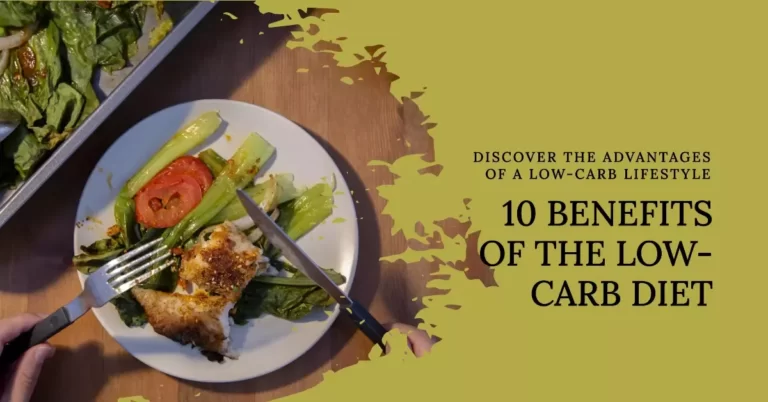Low-carb diets like keto and Atkins have exploded in popularity in recent years. But is cutting carbs really the magic bullet for weight loss? Can ditching bread and pasta help you finally lose that stubborn belly fat? If you’ve thought about trying a low-carb diet but aren’t sure of the facts, you’re not alone. With conflicting opinions everywhere, it’s hard to know what’s hype and what’s real when it comes to low-carb diets.
This article gives you the real facts about low-carb diets, with no spin or agenda. Just the science-based information you need to decide if low-carb is right for you. We’ll explain how low-carb diets help with weight loss, list the quick benefits you can get, and cover possible downsides to watch for.
You’ll get research-backed tips to improve your success on a low-carb diet. We’ll cover how to tell if low-carb is right for your body. You’ll also find answers to the top frequently asked questions about living low-carb long-term.
The goal is to provide practical advice to make low-carb diets work optimally for you. You’ll be able to identify if low-carb aligns with your lifestyle and health goals. And any common questions you have about sustaining low-carb eating will be addressed.
By the end, you’ll have helpful tips, self-assessment guidance, and all your low-carb questions answered – everything you need to decide if going low-carb is the best choice for your needs.
What are low-carb diets?
Low-carb diets limit your intake of carbohydrates like grains, starchy vegetables, and fruit. On a typical low-carb diet, carbohydrates may be restricted to 100-150 grams per day. On more extreme low-carb diets like the keto diet, carbs are limited to only 20-50 grams per day to induce ketosis. This is in contrast to the standard American diet, which often contains 300+ grams of carbs per day from foods like bread, pasta, sugary foods, and fruit.
Do low-carb diets work for weight loss?
Evidence on effectiveness
There is significant evidence from clinical studies showing that low-carb diets are effective for weight loss. In one major meta-analysis of 13 randomized controlled trials with over 1,000 subjects, people on low-carb diets lost an average of 7.7 pounds (3.5 kg) more weight after 1-2 years compared to those on low-fat diets. Other studies consistently show greater weight loss on low-carb diets lasting 6 months to 2 years compared to other diet approaches when calories are matched between groups.
Reasons they can promote weight loss
There are several reasons why low-carb diets tend to give faster and greater weight loss results. Low-carb diets naturally reduce appetite by lowering levels of the hunger hormone ghrelin. This allows you to eat fewer calories without counting or portioning everything you eat. Low-carb diets lead to decreased insulin levels, which allows stored body fat to be released and burned for energy. Metabolic changes induced by carb restriction also seem to optimize fat burning potential and improve markers of metabolic health.
Benefits of low-carb diets
May reduce appetite
One of the biggest benefits of low-carb diets is that they help control hunger and reduce food cravings. This makes it easier to eat less without feeling deprived or hungry all the time. Low-carb diets lower levels of the hormone ghrelin, which normally acts on the brain to increase appetite. Higher protein intake also helps increase satiety and fullness after meals.
Can lower blood sugar and insulin
Restricting carbohydrates leads to a decrease in blood sugar and insulin levels. For people with insulin resistance, prediabetes or type 2 diabetes, this effect can help normalize blood sugar levels and reduce the need for medication. Lower insulin levels allow the body to access stored fat for energy rather than accumulating it, promoting fat burning and making weight loss easier.
Promote loss of belly fat
Low-carb diets are especially effective for reducing fat stored around the organs in the abdominal cavity. This “visceral fat” inside the abdomen is metabolically active and associated with a higher risk of diabetes, heart disease and other conditions. Due to hormonal effects, low-carb diets help mobilize belly fat, leading to a significant reduction in waist circumference and more favorable body composition.
Potential downsides of low-carb diets
May be hard to stick to long term
One major downside of low-carb diets is that they can be difficult to adhere to for long periods of time, especially very low carb ketogenic diets. Eliminating major food groups like grains, sugars, and high-carb vegetables can lead to feelings of deprivation. Cravings for sweets and high-carb foods often return after several months on restrictive low-carb meal plans for many people.
Can cause low energy in some
When starting a low-carb diet, some people report feeling tired, lethargic and low on energy. This is because when carbohydrate intake is very low, your body switches from using glucose as the primary fuel source to using fat and ketones for energy. It can take time for your body to fully adapt to this metabolic shift, leading to the “low-carb flu” that some dieters experience.
Nutrient deficiencies if not balanced
Although low-carb diets don’t necessarily have to be nutrient deficient, restricting major food groups does require attention to meet all your nutritional needs. Low-carb junk food diets high in bacon, deli meat and cheese but low in plant foods have risks for deficiencies in vitamins, minerals and fiber over time. However, well-formulated low-carb diets that include plenty of low-carb vegetables and fruit can be sustainable.
Tips for success on low-carb diets
Focus on quality foods
When following a low-carb diet, it’s important to choose healthy, nutrient-dense foods as much as possible. Focus on getting enough lean protein (like fish, poultry, grass-fed meats, eggs), plenty of non-starchy vegetables, some fruit like berries in moderation, and healthy fats from sources like olive oil, avocados, nuts and seeds.
Watch your protein intake
While protein foods should be a staple on low-carb diets, eating excess amounts can put strain on the kidneys over time. Aim for around 0.6-0.8 grams of protein per pound of lean body mass (not total weight), adjusting amounts based on your activity level and muscle gain goals.
Include healthy fats
Low-carb and keto diets rely on adequate healthy fat consumption to provide fuel and energy. Focus on getting beneficial fats from monounsaturated and omega-3 fatty acid sources like olive oil, avocados, nuts, seeds and fatty fish. Avoid heavily processed oils and trans fats.
Manage cravings
To deal with sugar and starch cravings that can crop up, especially in the beginning, plan meals and snacks diligently so you’re not hungry. Drink plenty of water, herbal tea or coffee. Get regular exercise to help manage carb cravings as well.
Stay hydrated
Make sure to drink sufficient water and electrolyte-rich beverages when restricting carbs. Dehydration is a common side effect that can also disrupt appetite signals. Adding lemon, mint or cucumbers to water can help it feel like more of a treat.
In conclusion, low-carb diets can be very effective for weight loss and have health benefits for many people, especially those with metabolic syndrome or diabetes. Focus on eating whole, nutrient-dense foods, drink enough water, control cravings, and follow the plan long term to see success.
FAQs
Q: How many grams of carbs per day should you eat on a low-carb diet?
A: The recommended daily carb intake can range from 20-150 grams per day but optimal amounts vary by individual. Very low-carb keto diets typically restrict total carbs to just 20-50 grams per day to induce ketosis.
Q: What foods can you eat on a low-carb diet?
A: Low-carb diet foods include meat, fish, eggs, healthy oils, nuts and seeds, low-carb vegetables like leafy greens, asparagus, bell peppers, broccoli, etc. Fruit should be limited to small portions of berries. Grains, starchy vegetables, sugary foods are restricted or avoided.
Q: Is keto better than Atkins for weight loss?
A: The keto and Atkin low-carb diets are very similar, so neither plan is necessarily better than the other. Weight loss results still come down to maintaining a calorie deficit and sticking within carb limit goals, regardless of the specific low-carb diet.
Q: Is a low-carb diet healthy long term?
A: Lower carb diets can be safe and healthy for long term use if they are well-formulated and focus on nutrient-dense foods like vegetables, fruits, lean proteins and healthy fats. However, very restrictive keto diets may lack certain nutrients and are difficult for many people to sustain.
Q: How fast can you lose weight on a low-carb diet?
A: Many people lose 5-10 lbs in the first 1-2 weeks on a low-carb diet, but this is mostly fluid weight. A rate of 1-2 lbs of actual fat loss per week is more realistic and healthier to aim for over time.






